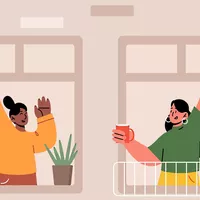Conversa entre vizinhas
||Voisines
||neighbors
Gespräch zwischen Nachbarn
Συζήτηση μεταξύ γειτόνων
Conversation among neighbors
Conversación entre vecinos
Conversation entre voisins
Gesprek tussen buren
Rozmowa między sąsiadami
Komşular arasında sohbet
邻居之间的对话
Rosa: Olá, bom dia!
Rosa: Hi, good morning!
Sou a Rosa, a sua nova vizinha do 1º andar!
||||||neighbor|||floor
Ich bin Rosa, deine neue Nachbarin aus dem ersten Stock!
I'm Rosa, your new neighbor on the first floor!
我是Rosa,你们一楼的新邻居!
Teresa: Bom dia, como está?
Teresa: Guten Morgen, wie geht es Ihnen?
Teresa: Good morning, how are you?
Teresa: 早上好,你好吗?
Eu sou a Teresa e moro no 3º Esquerdo.
||||||||Gauche
|||||live|||Left apartment
Ich bin Teresa und wohne in 3rd Left.
I'm Teresa and I live in the 3rd Left.
我是Teresa,住在3楼左侧。
Rosa: Prazer em conhecê-la.
|pleasure|in|meet|you
Rosa: Schön, Sie kennenzulernen.
Rosa: Nice to meet you.
罗莎:很高兴认识你。
É a primeira vizinha com quem falo.
||first|neighbor|||
Sie ist die erste Nachbarin, mit der ich gesprochen habe.
She's the first neighbor I'm talking to.
她是我第一个聊天的邻居。
Teresa: Então quando é que se mudou?
|so|when|||she|moved
Teresa: Wann bist du denn umgezogen?
Teresa: So, when did you move?
特蕾莎:那么你什么时候搬来的?
Rosa: Chegámos há 2 dias.
|Nous sommes arrivés||
|We arrived|ago|days
Rosa: Wir sind vor zwei Tagen angekommen.
Rosa: We arrived 2 days ago.
Rosa: 我们到这里已经两天了。
Ainda andamos a arrumar coisas.
|sommes en train||ranger|
|are still||tidy up|
Wir sind immer noch am Packen.
We're still packing things.
还在整理东西。
Teresa: Claro, mas isso é para ir fazendo.
|of course||that||for|going|doing it gradually
Teresa: Natürlich, aber das ist zu tun.
Teresa: Of course, but this is to be done.
Teresa: 当然,但这是逐渐做的。
E está a gostar de morar aqui?
|||like||living|here
Und leben Sie gerne hier?
And you're enjoying living here?
Rosa: Sim, o sítio é muito agradável.
|||endroit|||
|||place|||pleasant
Rosa: Ja, der Ort ist sehr schön.
Rosa: Yes, the place is very nice.
Rosa: 是的,这个地方非常宜人。
E a escola dos miúdos é aqui perto, dá para eles irem a pé.
||||enfants|||||||aillent||
||||kids||here|near|it is possible|||to go||on foot
||||niños|||||||||
Und die Kinderschule ist in der Nähe, sie können zu Fuß gehen.
And the kids' school is near here, you can walk them.
孩子们的学校就在附近,他们可以步行过去。
Teresa: Claro, isso é ótimo!
||that||great
Teresa: Sure, that's great!
Teresa: 当然,这太棒了!
Os meus também vão a pé.
|"Mine"||go||
Mine will also walk.
我的也是走路去的。
Que idade têm os seus?
what|age|||"your children"
How old are yours?
你的孩子多大了?
Rosa: A Joana tem 7 e o Miguel 8.
||||||Miguel
||||||Miguel
Rosa: Joana has 7 and Miguel 8.
Rosa: 约翰娜7岁,米格尔8岁。
Teresa: São quase da idade dos meus.
||almost||||
Teresa: They're almost my age.
Teresa: Eles são quase da idade dos meus.
Eles que apareçam logo à tarde depois das aulas para se conhecerem e brincarem juntos!
||qu'ils apparaissent|dès que possible|||après||cours|||se connaître||jouer ensemble|ensemble
||show up|soon||afternoon||||||meet each other||play together|
Lassen Sie sie am Nachmittag nach der Schule auftauchen, um sich kennenzulernen und zusammen zu spielen!
Let them show up in the afternoon after school to meet and play together!
下午放学后他们就可以出现,互相认识并一起玩耍!
Rosa: Boa ideia!
Rose||
||idea
Rose: Good idea!
罗莎:好主意!
Obrigada!
谢谢!
Teresa: Então está combinado.
|so||agreed
Teresa: Dann ist das geklärt.
Teresa: So it's settled.
Teresa: 那就这样决定了。
Até logo!
Until|
See you later!
再见!
Rosa: Até logo!
Rosa: See you later!
Rosa: 再见!

